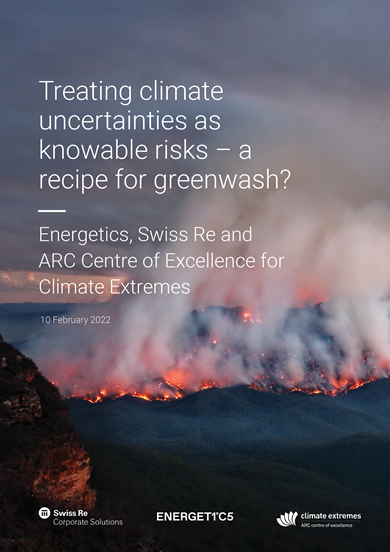Experts from climate science and corporate insurance have joined Energetics to express their growing concern that organisations are attempting to understand, manage and quantify the physical impacts of climate change using flawed assumptions.
The problem is outlined in a new paper, Treating climate uncertainties as risks – a recipe for greenwash trouble ahead? in which Energetics, Swiss Re and the ARC Centre of Excellence for Climate Extremes, contend that business is confusing uncertainty with risk when addressing climate change. While it’s widely understood that climate change presents profound challenges, the methods by which businesses assess climate impacts are too often incorrectly based in traditional risk assessment practices which assume that the climate is relatively stable and experienced within an envelope of known probabilities.
This failure to distinguish between risk and uncertainty leads to modelling and analyses that result in market disclosures that are potentially misinformed at best, or misleading at worst.
When organisations come to see that climate change is a growing challenge, they also need to recognise that what they face are unprecedented and profound uncertainties. For this reason, climate change cannot be treated as “just another risk”. It is too different in nature and too far outside the expertise of most businesses.
What the authors of the paper are seeing are climate risk assessments and disclosures in which numerical values have been assigned to climate risk factors for which there may be no underlying scientific basis.
Furthermore, even where uncertainty is appropriately recognised, the techniques, tools and, in particular, the data used to understand the uncertainty are in the most part unregulated, untested and unscientific. This is rarely made transparent to the end users of the analyses that they underpin.
What must organisations do to change their approach and avoid the potential for greenwashing?
A first step in the response of any business attempting to deal with the current or future impacts of climate change is to the accept the existence of uncertainty. When something is unknown, an organisation should say “we just don’t know”. Why? Because having to face uncertainty triggers innovation.
We observe that too often when a business really needs innovation informed by an understanding of climate change drivers and implications, what it gets are arguments for adapting current practices to make them work, not overengineering change to keep things simple, postponing action until more is known and following what competitors or industry are doing. This often leads to an extensive sustainability report signed off by the auditor or an accountant, but with little value in helping the business or its stakeholders make appropriate and robust decisions in relation to the business’ future resilience and prospects in the face of climate-related change.
Actions can be taken today to seek to minimise any locked-in negative impacts that could occur in the future. For example, reducing or at least not increasing exposure to the known hazards. On the second, the call to immediate action is to understand the range of potential possible futures and take actions that will make the business resilient to as many of these futures as possible.
The other important aspect of managing uncertainty is to know the trigger for your next key decision as the future becomes more certain, and to establish and monitor metrics that will provide the appropriate trigger. Without taking these actions, businesses become ‘sitting ducks’ as the world moves around them. Scenario analyses provide the gateway to understanding potential futures and advisory professionals are well placed to advise on methodologies and run analyses in partnership with organisations.
The key capability uplift for business decision makers is to feel confident in taking short and medium-term decisions that seek to ensure the resilience of the organisation’s success, despite the uncertainty over the path ahead and the outcomes that will therefore be delivered. This will also require them being comfortable that they are able to recognise and act to modify those decisions as greater certainty of climate-related change evolves.




